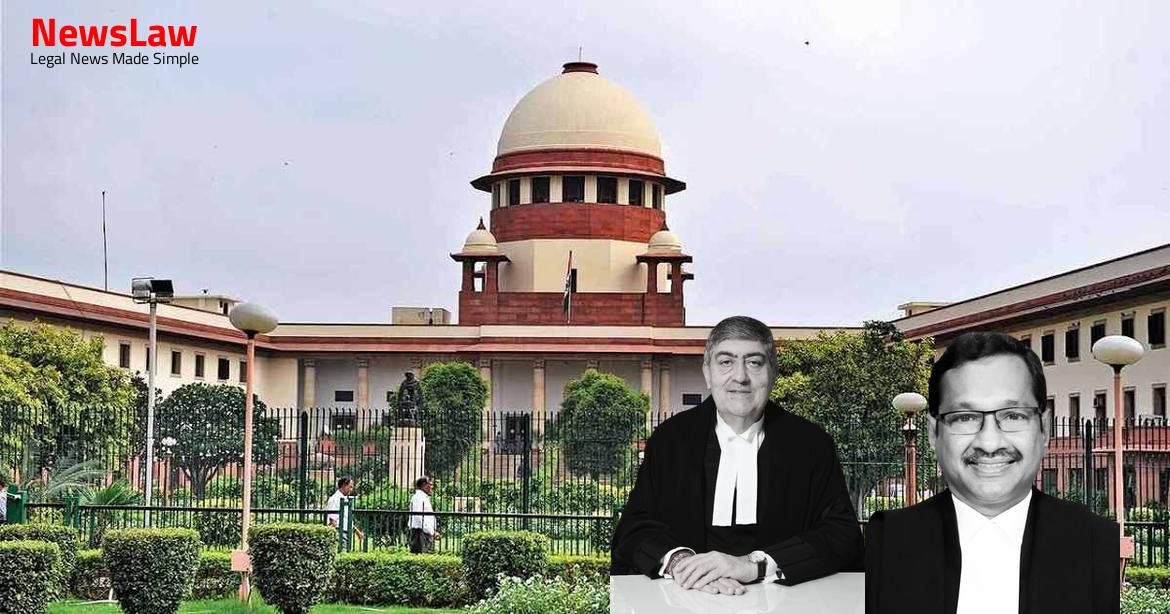Explore the significance of the sealed cover procedure in promotion cases and the critical legal considerations involved in ensuring fair and just decision-making. The court’s analysis emphasizes the importance of upholding natural justice principles and maintaining uniformity in handling such matters. Delve into the complexities of minor penalties and their impact on promotion entitlements through this legal case summary.
Facts
- The respondent filed an appeal before the Appellate Authority in 1990, which was rejected.
- A Writ Petition was filed before the High Court of Kerala directing the bank to consider the respondent’s case without the sealed cover procedure.
- The respondent was censured in 1987 due to a charge-sheet which affected the promotion.
- The respondent was eventually granted promotion, but the issue was regarding entitlement to promotion from an earlier date.
- The respondent retired in 2003 and received all retirement and pension benefits.
- Disciplinary action was initiated against the respondent in 1985, leading to a censure in 1987.
- The promotion to Middle Management Grade Scale-III was considered in 1984.
- The Interview Committee recommended the respondent for promotion, but a disciplinary action delayed the process.
- Despite censure and the sealed cover procedure, the respondent’s promotion was not given effect to after the censure period.
- An interim stay was granted in 2009 during the legal proceedings.
- The appeal was dismissed by a brief order dated 30.5.2003 by the Division Bench.
- The Writ Petition was allowed by the learned Single Judge in terms of order dated 30.5.2003.
- The decision to take disciplinary action against the respondent dated 28.1.1985 was considered the only impediment for the respondent, entitling him to the benefit of promotion.
Also Read: Supreme Court Judgment on Single Till Mechanism for HRAB Calculation: A Comprehensive Analysis
Arguments
- The appellant’s counsel argues that the respondent was only given a minor penalty of censure, so the sealed cover should not be implemented, and his case should be considered at the next promotion after the conclusion of the departmental proceedings.
- The appellant’s counsel points out that the respondent’s case falls under sub-clause (a) of Clause (i) of para 3, as stated in the guidelines.
- According to sub-clause (iv) of the guidelines, if department proceedings result in a minor penalty like censure or recovery of pecuniary loss, the accommodation in the sealed cover will not be considered. Instead, the employee may be considered for promotion at the next opportunity after the departmental proceedings.
- The appellant bank followed the staff Circular No. 118 (Exhibit P-2) regarding the sealed cover procedure for promotions, and the respondent was eventually promoted as per the procedure.
Analysis
- Principles of natural justice must be adhered to
- Maintaining uniformity is essential
- Decision-making process should be fair and just
- In State of M.P. & Anr. Vs. I.A. Qureshi, it was held that when a minor penalty has been imposed on an employee, the sealed cover recommendation of DPC cannot be opened.
- The recommendation of the DPC cannot be given effect to if a minor penalty, such as censure, has been imposed, as per the relevant circular.
- The employee must be fully exonerated for the recommendation of DPC to be considered, according to the judgement.
- In Union of India & Ors. Vs. A.N. Mohanan, it was stated that even the imposition of a censure, a blame-worthy factor, prevents the findings of the sealed cover from being acted upon.
- The employee can be considered for promotion on a prospective basis only.
- The consideration for promotion can start from the date after the conclusion of the departmental proceeding.
- Censure, being the least of the minor penalties, does not warrant the application of the sealed cover procedure for promotion.
- The State Bank of India (Supervising Staff) Service Rules specify ‘censure’ as the first minor penalty.
- According to staff Circular No.118, the sealed cover procedure should only be adopted when a prima facie case against the officer is established, based on the ultimate penalty imposed in the disciplinary proceedings.
Also Read: Selection and Appointment of Judicial Officers in Himachal Pradesh
Decision
- Civil appeal allowed in terms of the signed reportable order.
- Pending applications disposed of.
- Recommendations of the selection committee in favor of an employee in a sealed cover not given effect and may be considered in the next promotion thereafter.
- Disciplinary action initiated against the respondent before promoting authority could consider the recommendation.
- Select list issued keeping respondent’s result in a sealed cover.
- Punishment of censure imposed on the respondent on 28.7.1987 after departmental proceedings.
- Appeal against censure dismissal made aspect final.
- Impugned orders of Single Judge and Division Bench set aside, appeal allowed.
- Parties to bear their own costs.
- Respondent’s promotion earned belatedly, a possible reason for non-involvement in current proceedings.
Case Title: STATE BANK OF INDIA Vs. C.K.KARUNAKARAN (2021 INSC 582)
Case Number: C.A. No.-006821-006821 / 2009



